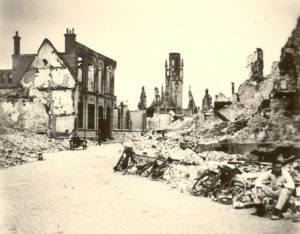By Neal Oussoren
Summer 2021 Newsletter
[Editor’s note: We don’t usually hear about European kids using bikes as a primary means of transportation, but we got this story from P4P supporter Neal Oussoren. He wrote us a note that mentioned an interesting experience with a bike in World War II. I spoke with Neal by phone. Here is what he told me.]
I was born in 1934 in Middelburg, in the Zeeland province in the southwestern Netherlands. I was oldest of 5 children. My father was a minister. We lived in a house next to his church.
 Middelburg was occupied by the German army in 1940 in the Battle of Zeeland. Much of the old town was destroyed.
Middelburg was occupied by the German army in 1940 in the Battle of Zeeland. Much of the old town was destroyed.
Staples became scarce. Food was rationed. We had coupons that specified what we were entitled to per week. We spread soft white cheese on bread. After the war I remember aid from the US: clothes, shoes, food, including peanut butter.
Though some foods were in short supply, my father had lots of contacts in the community. He knew several farmers who lived within a few kilometers of town. We did not have a car. It would not be easy to get food from the farms on foot; it would be much easier on a bike.
In 1941 my father bought a bicycle. You braked by pressing your shoe against the front wheel. The Germans were confiscating bikes at the time, so my father replaced the front wheel with a much smaller wheel, from a scooter, to make the bike less likely to be confiscated. Also, the Germans were less likely to take a bike from a 10-year-old. My father attached wooden blocks to the pedals so I could reach them.
My job was to visit several farms outside town. I picked up milk and bread year-round, vegetables in the growing season. During the school year I left home by 7 a.m. so I could be back by 8 to go to school. I rode about 7 miles to do my pickups.
I carried the milk and vegetables in containers on the bike. The back of the bike was piled so high I could not swing my leg over the vegetables, so I had to step over the top tube.
On one of my trips a German truck cut a corner too close. I forgot about the bag on the back of the bike, so when I tried to swing my leg over I crashed and got knocked out. I came to and made it home OK.
On another trip, I noticed that Dutch collaborators, members of the NSB party, were confiscating milk on a bridge on my usual route. I warned others. One of my friends told me that he could help me get across the river at a nearby concrete factory. I picked up the milk and rode to the factory, where my friend rowed me, my bike, and the milk across the river. I took a different route back to the city to avoid the collaborators.
I’ve lived in the US since 1951, but my wartime memories are vivid. The bike was a godsend.
